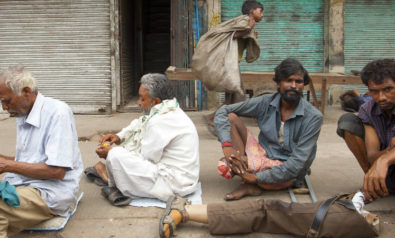Social rights can no longer be relegated to a secondary position in the US Constitution.
According to a study by the Toronto Initiative for Economic and Social Rights, more than 90% of 195 constitutions around the world guarantee at least one economic and social right. Nearly 68% of those constitutions contain a provision addressing health. The question of whether health is even a right is hardly contested. In the United States, however, the question still prevails.
All rights—civil, political, economic or social—were intended to be the same. Under international human rights law, little distinction is placed between types of rights. In other words, the right to life or the right to vote is not deemed to be different from the right to education or health. The Universal Declaration of Human Rights even establishes that all human rights are “interdependent, indivisible, and interrelated.”
Not All Rights are Created Equal
Despite this understanding, however, the underlying question that came to prominence at the international level when those words were first proclaimed was whether social rights were to be seen as different from civil and political rights.
At the height of the Cold War, the position of states—where the understanding of a right was concerned—depended upon the kind of duty a right could impose. Eastern Bloc states supported the view that rights could impose duties that cause states to act. To the US and the West, a “right” could not be a “right” if it imposed any positive obligation at all. According to Western legal norms, only civil and political rights could be understood as basic human rights, because their enforcement would pose no positive obligation on the state. Economic and social rights could be not seen as rights at all, as their enforcement could put the cost on the state to provide for its people.
Nearly 60 years later, this discrepancy is yet to be resolved. Today, the central position on health in the US rests on the extent to which access to health care should be seen as a fundamental human right. While proponents of the far-left argue that universal health coverage should be ascertainable for all, the far-right cautions that its enforcement is costly and could cause the government to intervene in state matters. In essence, the distinction lies upon the extent to which health should become affordable through the realm of federal government.
Tracing back to the tenants of natural rights themselves, the position of the US has leaned toward the protection of civil and political rights. The US Constitution, for example, mentions a range of civil rights: freedom of expression, the right to vote and the principle of non-discrimination and equality are seen as supreme. Rights to health and education, however, are completely missing and fall within the ambit of the individual states.
For centuries, the view has been that through the protection of civil and political rights, other basic needs could be guaranteed. For example, with the guarantee of freedom of expression or the right to vote, people’s rights to health or education could be ascertained. In other words, through the exercise of one’s right to vote or free speech, one had a say in the policymaking process responsible for the attainment of social rights. Thus, by focusing on the connection between rights, civil and political rights were to be vindicated as necessary for meeting all fundamental needs.
“Purely Nominal”
But in a society where mass inequities with respect to health care and other rights exist, can such a position still afford to stand? Premature deaths continue to disproportionately impact certain populations in America. According to the World Health Organization, children born to “African-American women are 1.5 to 3 times more likely to die than infants born to women of other races/ethnicities.” African-American men are more likely to develop cancer than any other ethnicity—a rate of 598.5/100,000.
The US is one of the wealthiest nations in the world. Yet in comparison to other members of the Organisation for Economic Co-operation and Development (OECD), “the US has some of the worst health and other social indicators, including the highest rates of infant mortality, maternal mortality and teen pregnancy.” As a proclaimed leader of the free world, the US has yet to ratify a number of international treaties calling for the protection of both civil and political, and economic and social rights alike. The US is still to ratify both the Convention on the Elimination of Discrimination Against Women and the International Covenant on Economic, Social and Cultural Rights. Other than Somalia, it is the only country in the world that has not ratified the Convention on the Rights of the Child.
Some scholars say that the time has come where social rights may need to reign supreme. Henry Shue, for example, was among the first to proclaim that economic and social rights were a basic human need. In his “Four Freedoms” speech, President Franklin D. Roosevelt held the view that alongside freedom of speech, the right to remain free from fear, and the right to worship one’s God is the freedom from want, which was to mean a freedom from lack of a social and economic need. Constitutionalizing rights in this sense, where no distinction is placed between the kinds of rights, may help facilitate the realization of socioeconomic rights. It could highlight the importance of all rights.
Without socioeconomic rights, for example, civil and political rights may be “purely nominal,” and without civil and political rights, social rights may not be ensured. The United Nations has long proclaimed that the violation of one right leads to the violation of many. In this respect, a move by the US to uphold social rights as “rights in and of themselves” may help the state align its visions in accordance with the views of the world.
Blurring Distinctions
Both at the national and international level, steps have been made to ensure the equal importance of all human rights. Nongovernmental organizations and civil society organizations have mobilized around socioeconomic entitlements to re-characterize socioeconomic rights as basic human rights. Human rights bodies and courts around the world look to enforce rights in an integrated manner and have come to expand the scope and content of rights. For example, the general recommendation by the Committee on the Elimination of Discrimination Against Women regarding women and health links women’s rights to nondiscrimination and health care, thereby uniting the concepts of both civil and political and economic and social rights.
Moreover, current judicial practices with socioeconomic rights suggest that the distinction placed between rights has been increasingly blurred. Judges around the world rely upon the right to life, for example, to uphold socioeconomic rights. Notions of health, as a result, are said to be illuminating the content and meaning of rights related to life, security, survival and sexuality, especially as they relate to the provision of services needed to protect human rights of women and people living, for instance, with HIV/AIDS.
While the intent of those who framed the US Constitution may have been that civil rights were to take center stage, the time has come when social rights can no longer be relegated to a secondary position.
The views expressed in this article are the author’s own and do not necessarily reflect Fair Observer’s editorial policy.
Photo Credit: Chris Parypa Photography / Lenetstan / Shutterstock.com
 We bring you perspectives from around the world. Help us to inform and educate. Your donation is tax-deductible. Join over 400 people to become a donor or you could choose to be a sponsor.
We bring you perspectives from around the world. Help us to inform and educate. Your donation is tax-deductible. Join over 400 people to become a donor or you could choose to be a sponsor.
Support Fair Observer
We rely on your support for our independence, diversity and quality.
For more than 10 years, Fair Observer has been free, fair and independent. No billionaire owns us, no advertisers control us. We are a reader-supported nonprofit. Unlike many other publications, we keep our content free for readers regardless of where they live or whether they can afford to pay. We have no paywalls and no ads.
In the post-truth era of fake news, echo chambers and filter bubbles, we publish a plurality of perspectives from around the world. Anyone can publish with us, but everyone goes through a rigorous editorial process. So, you get fact-checked, well-reasoned content instead of noise.
We publish 2,500+ voices from 90+ countries. We also conduct education and training programs
on subjects ranging from digital media and journalism to writing and critical thinking. This
doesn’t come cheap. Servers, editors, trainers and web developers cost
money.
Please consider supporting us on a regular basis as a recurring donor or a
sustaining member.
Will you support FO’s journalism?
We rely on your support for our independence, diversity and quality.



















